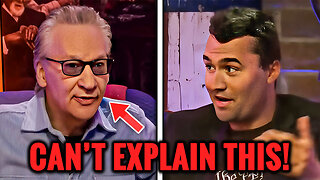Premium Only Content

Episode 1412: How offensive are we really?
Here we are on the 1st Friday of the month – August and do we really focus on how we offend Christ? As we were saying the Novena to SHJ you do pause and say I am offending the Sacred Heart of Jesus. Do we really know and understand How offensive we really are? I bet most Catholics either don’t know when they offend Christ or if they do they tend not to really care. As for me, I do know and I do care but I still do. Our daily struggle is to stay out of our lower faculties and truly work hard at our higher and when we do fall short and sin due to our lower faculties immediately run off in prayer and reconciliation. Let Christ know you know and you are heartly sorry.
You are probably asking yourself – What are my lower and higher faculties?
the terms "lower faculties" and "upper faculties" are used to describe different aspects of human nature and the hierarchical structure of human faculties or powers.
Lower Faculties: The lower faculties refer to the more instinctual, sensitive, and natural powers of the human person. These faculties are associated with the physical and emotional aspects of human existence. The three primary lower faculties are:
a. Senses (External and Internal): These faculties allow us to perceive the external world through sight, hearing, taste, touch, and smell. Internal senses, such as imagination and memory, also play a role in processing and understanding sensory information.
b. Appetites (Concupiscible and Irascible): The concupiscible appetites involve desires related to pleasure and avoidances of pain (e.g., desire for food, pleasure, rest). The irascible appetites involve desires related to overcoming difficulties and facing challenges (e.g., courage, hope).
c. Emotions: Emotions are responses to various stimuli that can lead to joy, sadness, fear, anger, and so on.
Upper or Higher Faculties: The upper or higher faculties refer to the more intellectual and spiritual aspects of human nature. These faculties are associated with reason, understanding, and the capacity to pursue higher truths and moral values. The three primary higher faculties are:
a. Intellect: The intellect is the faculty of the mind that enables us to reason, understand, and grasp truths about the world and spiritual matters.
b. Will: The will is the faculty of the soul that enables us to make choices and decisions. It is the capacity to choose good or evil and to act in accordance with our rational understanding.
c. Rational Appetite (or Rational Desire): This is sometimes referred to as the "higher appetite." It is the aspect of the will that desires higher goods, such as virtue, love, and union with God.
The distinction between lower and higher faculties is essential in Catholic moral theology and spiritual formation. The Catholic Church teaches that the integration and harmonization of these faculties are crucial for human flourishing and moral development. Through proper formation and discipline, individuals are encouraged to align their lower faculties with the higher faculties, with the ultimate aim of growing in holiness and becoming more Christ-like. This involves subduing and guiding the lower, instinctual tendencies toward virtuous actions and spiritual growth.
According to Catholic teachings, sins and actions that offend the Sacred Heart of Jesus include:
Blasphemy: Any irreverent or disrespectful speech or actions towards God or sacred things.
Ingratitude: Failing to acknowledge and give thanks for God's blessings and gifts.
Indifference: A lack of concern or care for God's will and commandments.
Heresy: Holding and spreading beliefs that contradict or deny essential Catholic doctrines.
Idolatry: Worshiping or giving undue devotion to anyone or anything other than God.
Violation of the Lord's Day: Failing to observe the Sabbath (Sunday) as a day of rest and worship.
Sacrilege: Desecrating sacred objects, places, or rituals.
Disobedience to the Church: Rejecting or disobeying the teachings and authority of the Catholic Church.
Lack of Love: Failing to love God and one's neighbor as oneself.
Immorality: Engaging in actions contrary to the moral teachings of the Catholic Church, such as adultery, fornication, and other sexual sins.
It is important to note that these offenses are not limited to actions alone but can also include sins of the heart and mind. The devotion to the Sacred Heart encourages Catholics to seek forgiveness for their sins through the Sacrament of Reconciliation (Confession) and to strive for a more profound relationship with Jesus through prayer, acts of charity, and a life of virtue.
So we as Catholics have to ask ourselves are we offending Christ and if so Stop It.
I want you to hear a short talk by a priest on this matter.
-
 12:15
12:15
Nikko Ortiz
17 hours agoMonday Gun Fails
61.2K11 -
 8:19
8:19
MattMorseTV
16 hours ago $10.48 earnedTrump is ACTUALLY DOING IT.
61.2K46 -
 5:40
5:40
Sugar Spun Run
23 hours ago $0.80 earnedNutella Brownies
9.66K -
 8:46
8:46
Faith Frontline
15 hours agoBill Maher STUNNED as Charlie Kirk Proves God Exists
4.03K9 -
 LIVE
LIVE
FyrBorne
9 hours ago🔴Warzone M&K Sniping: On the Hunt For The Next Fun Builds
91 watching -
 7:11
7:11
MudandMunitions
12 hours agoNY Legal, Still LETHAL! Colt M4 + Griffin Armament GPS3X Prism Sight! NIGHT SHOOT
8.58K3 -
 2:11
2:11
WildCreatures
2 days ago $0.47 earnedBrilliant Blue Hyacinth Macaw Eats Nuts With Impressive Dexterity
8.74K5 -
 29:45
29:45
DeVory Darkins
15 hours ago $5.04 earnedDemocrat Governor suffers EMBARRASSING LOSS to Trump as ICE takes Garcia into custody
16.7K59 -
 24:50
24:50
Bitcoin.com
16 hours agoEthereum hit an ATH this weekend | The Weekly Recap for Aug 25
12.7K -
 56:27
56:27
Actual Justice Warrior
15 hours agoAnti-White Celebrity DESTROYED On Jubilee
13.3K11